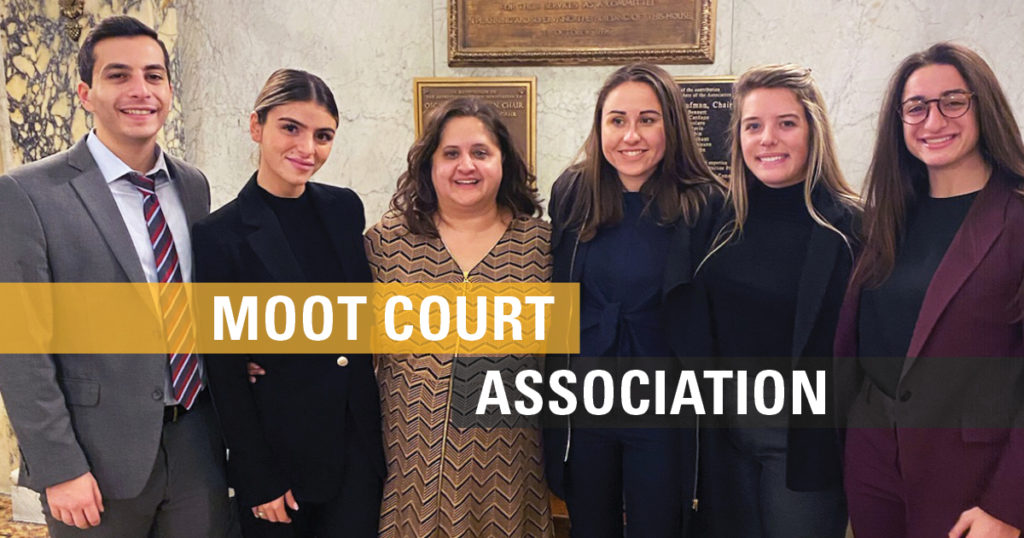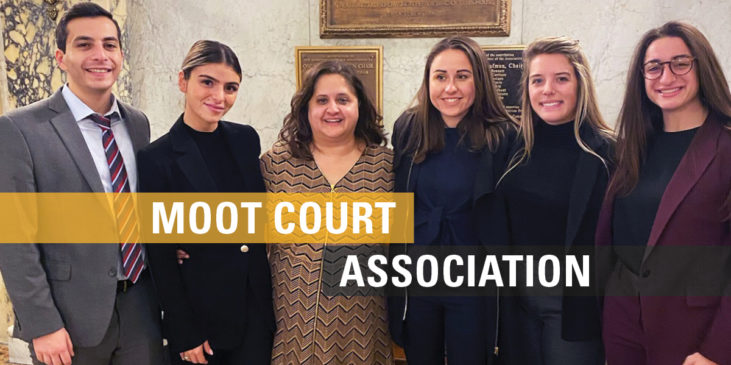
Through NYLS’s Moot Court Association (MCA), students sharpen their appellate oral advocacy and brief-writing skills while representing the School in competitions across the country.
This fall, NYLS was a quarterfinalist in two major moot court competitions, with support through a new MCA Senior Fellow Program. The program, developed by new Moot Court Faculty Advisor Ann Schofield Baker ’97, pairs individual teams with a highly experienced attorney coach to help them prepare for competition.
“Both teams that were coached by a Senior Fellow this fall advanced to the quarterfinals in their respective competitions,” Professor Baker said. “This demonstrates the value of consistent, focused coaching by a highly experienced attorney. That said, the students ultimately deserve all the credit for their success since it was their hard work and dedication that yielded such impressive results.”
Quarterfinalist in New York City Bar Association Moot Court Competition
NYLS blazed through the regional rounds of the 70th annual National Moot Court Competition, held November 20–21, 2019 at the New York City Bar Association.
Caroline McGuire 3L and Gabriella Castellano 3L, coached by Elizabeth Harvell 3L, finished as quarterfinalists. (The same dynamic trio landed third in a national family law moot court competition earlier in 2019.)
In addition, a second NYLS team consisting of Zachary Freedman 3L and Jena Silverman 4L Evening also performed strongly in the same competition.
The high-profile competition focuses on appellate advocacy skills, including oral arguments and brief writing. This year’s fact pattern was set in the fictitious land of Kryptonia, following Congress’s passage of the “Alien Sedition Act.” The Act made it a crime for an undocumented individual to advocate for a change to any law or for the election of any candidate. In the mock scenario, the petitioner was prosecuted under the Act for giving a speech at a public rally. Student competitors examined two issues: whether the petitioner had exhausted his administrative remedies (so that a federal court would have jurisdiction to hear the case) and, if so, whether the petitioner could invoke the First Amendment in his case.
The teams received positive feedback from the judges throughout the rounds of competition. Teammates thanked Professor Baker, Senior Fellow Deborah Meyer ’98 (an accomplished MCA alumna who argued in front of Justice Antonin Scalia in NYLS’s 1996 Froessel Competition), Professor Susan Abraham, Professor Arthur Leonard, and other members of the Moot Court Association for their support.
Castellano said that the competition “gave me a better understanding of what it means to be an appellate advocate.” She added, “Although knowledge of the law and facts is necessary, the judges repeatedly emphasized that they were looking to have a conversation with the competitors. … This taught me that going off-script is not a bad thing; rather, it shows an in-depth understanding of complex material and the ability to convey that understanding in a straightforward way.”
Meyer said that the NYLS competitors “worked diligently as a team” and that MCA’s Senior Fellow Program “allows alums to reconnect to Moot Court by giving back and working closely with students in a truly meaningful way.”
Quarterfinalist in National Veterans Moot Court Competition
NYLS also advanced to the quarterfinal round of the National Veterans Moot Court Competition, held November 2–3, 2019 at The George Washington University Law School in Washington, D.C. The competition is also hosted by the U.S. Court of Appeals for Veterans Claims.
Heidi Moore 3L Evening and Brianne Kelly 3L—who stepped in with two days’ notice when teammate Jessica Pooran 3L fell ill—competed against 21 teams from law schools across the country.
They tackled a challenging problem: whether the Board of Veterans Appeals had deprived a veteran of his constitutional due process rights by not providing him the opportunity to testify in front of a Veterans Law Judge, who denied his claim for disability benefits. The case also concerned the U.S. Bureau of Veterans Affairs’ interpretation of the term “affirmative evidence.”
Moore reflected on her enthusiasm for the team. “Moot Court unquestionably helps you refine your persuasive writing skills, but I love the oral advocacy aspect of the competition even more than the writing,” she said. “I love being challenged to respond on the spot to opposing counsel’s arguments or the judge’s questions.”
Professors Baker, Lenni Benson, and Kirk Burkhalter ’04 helped moot the team ahead of the competition. Key support also came from Senior Fellow and Adjunct Professor Melissa Molfetas, Supervising Attorney of the Veteran Advocacy Project (part of Manhattan Legal Services) and a member of the New York City Bar Association’s Military and Veterans Affairs Committee, as well as Dao Sun, a Senior Staff Attorney at the Veterans Justice Project.
Senior Fellow Program to Continue
Professor Baker plans to expand the MCA Senior Fellow Program following its successful pilot phase. She is now interviewing candidates for next semester. While NYLS often draws on its talented alumni community to fill these roles, Senior Fellows need not be alumni and can contact ann.baker@nyls.edu if they have 10 or more years of experience in their practice area and are interested in coaching NYLS students.
Special thanks to MCA alum Brian Schrader ’98, President and CEO of BIA, who has generously supported the Senior Fellow Program.

